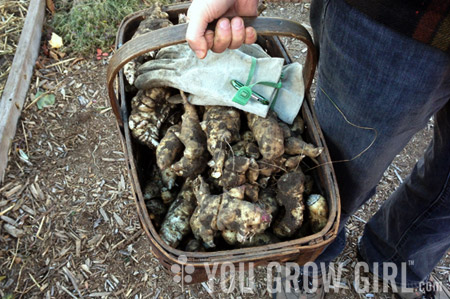
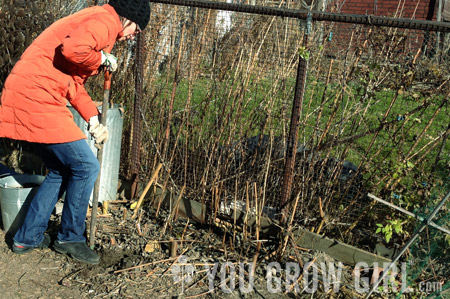
Last weekend we dug up a boatload of Jerusalem artichokes aka sunchokes from the garden, right on schedule.
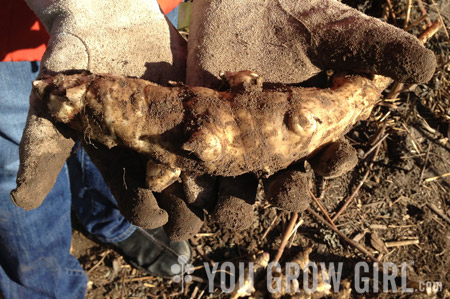
Believe it or not, many of the tubers are even bigger this year than last. And there are more of them! God help us.
When we began digging, I told Davin that we would only be excavating a few. But it’s like once you start you just can’t stop. And when you do think to stop you tell yourself, “Well, I have GOT to get the tubers that have grown into the neighbour’s yard. They’re compromising the fence!” The next thing you know, you’ve got a basket so big you can barely even lift it.
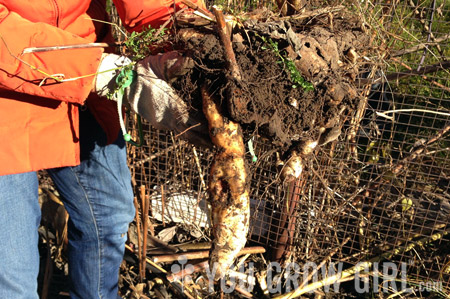
To be fair, Jerusalem artichoke (Helianthus tuberosus) would be a welcome sight each fall, were I able to eat enough to make a dent into the yearly harvest. They’re a very tasty, crunchy, nutty-flavoured tuber with a low glycemic index, which makes them a fantastic, healthy substitute for potatoes. They produce like a house on fire with practically no effort at all. The plant is often affected by powdery mildew and I have noticed a few holes in the tubers from an unknown burrowing insect, but neither pests ever make a dent in the harvest or compromise its quality. Sunchokes are high in thiamin, potassium, and iron, unfortunately they are also full of inulin, a carbohydrate that can be quite difficult to digest. Some people seem to build up a bit of a tolerance over time, but I find that I can only eat them in very small quantities or risk digestive upset. For that reason I’d like to find a soup kitchen to donate some to this season.
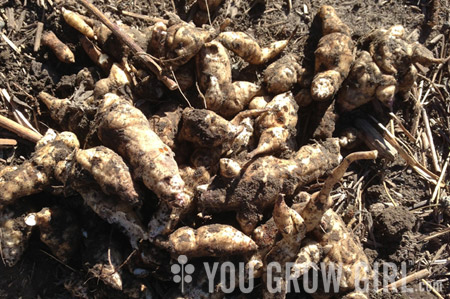
Storing Sunchokes:
I’ve found that they store fairly well when kept unwashed in cold temperatures, just below freezing. I’ve been keeping mine fresh outside on the porch right up against the house where they benefit from the heat of the brick. We haven’t had any snow yet, but when we do they will have to go into a cold storage room in the basement.
The best way to store them long-term is to simply leave them in the ground. Cover the area with a thick blanket of straw to help keep the ground from freezing solid so that you can dig them up as you need them.
Freezing: I haven’t tried this method yet, but am planning to try making some soup from them and freezing that, in the same way that I make and freeze vegetable soups from the scraps that remain in the garden at the end of the season. In this form it shouldn’t matter if they thaw mushy.
Pickling: Last year I experimented with pickling Jerusalem artichoke and it was so good that I plan to make up vast batches as gifts with what I do keep of this lot. I was pleased to find that the pickled tubers were very digestible — we haven’t had any “wind-related” problems eating them in this form. I’d tell you how I did it but I made the recipe up and didn’t write the damn thing down! This is why I always keep a notebook and pen in the kitchen now. I’ll post it here sometime this season, once I figure it out.
——————
There is more about growing Jerusalem artichoke in the root vegetable section of my book, “Grow Great Grub.”
What a great harvest! Ironically, I can’t get them to grow in my yard because the squirrels eat the tops as soon as they come through the soil, and they just keep eating them down to bare nubs all season. :(
Interesting. The squirrels do nibble at the tubers if they heave above the soil line, but they don’t bother the plant.
Do you have any to share? I’d gladly pay for them, plus shipping.
I bought some from the produce section of my local co-op grocery store a few years ago and then planted them. They are gorgeous, but I don’t think we’ll ever get rid of them. We tried to dig up every one last year, but alas they came back in droves! A yummy problem.
I ate Jerusalem artichokes for the first time this year, to see if I would like them enough to grow in my garden. They tasted all right, nothing amazing, but oh… the digestion or rather lack of digestion… never again!
YES- digestable pickle recipe PLEASE and any other way you find around this problem would be fab!